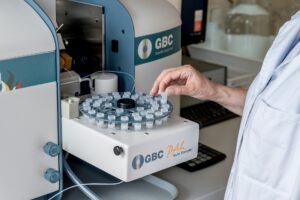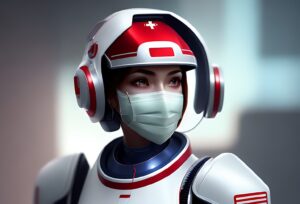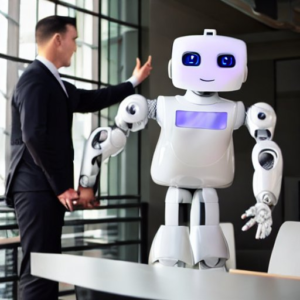Will Artificial Intelligence Replace Healthcare Workers?

We’ve been hearing a lot about the rapidly developing capabilities of artificial intelligence (AI), potential dangers, societal disruption and even solutions that may save the planet and significantly prolong the human lifespan. So, what exactly is AI? In purely technical terms, AI is the ability of machines to simulate human intelligence, enabling them to perform tasks that typically require human cognition, such as learning, problem-solving, decision-making and language processing. AI is currently being used in a wide range of applications, including speech and image recognition, natural language processing, predictive analytics and autonomous vehicles.
The use of AI in healthcare is not a new phenomenon. In fact, it’s been around for decades, aiding in the diagnosis and treatment of patients. However, with the rise of machine learning and big data, AI has become more powerful and versatile than ever before. AI algorithms can analyze a patient’s genetic information, medical history, and other data to develop personalized treatment plans. It can also learn from its mistakes and improve over time. This could lead to better outcomes for patients and a more efficient healthcare system overall.

AI’s development may prove a boon in terms of the worsening doctor shortage. Even now, medical providers are integrating AI into their businesses, which may account – at least in part – for the increase in available locums tenens jobs as practitioners dedicate time to training and implementation. But while AI is undoubtedly useful, there are concerns that it could eventually replace human healthcare practitioners – if AI can diagnose diseases and develop personalized treatment plans based on a patient’s medical history and genetics, what role will there be for human doctors and nurses?
The idea of AI replacing doctors and nurses may sound like science fiction, but the reality is that AI is already taking on many tasks previously performed by humans. For example, I am a copywriter and, as OpenAI’s application “ChatGPT” develops, it promises to do better than… this. As AI continues to improve and become more powerful, it could start to perform tasks that were previously the domain of human doctors, nurse practitioners and other providers. AI is already leading to some displacement of healthcare practitioners in fields where pattern recognition plays a big role, such as radiology.

As AI is matched with robotic developments, it will be capable of performing the work of most healthcare professions. Though some see resistance to change as a natural cooler, healthcare providers may test the waters by using AI first in locums tenens jobs. If trials are successful, healthcare providers are likely to pursue a growing number of AI healthcare technologies. Thankfully, AI is unlikely to displace human healthcare practitioners entirely. While AI is undoubtedly useful, it cannot replace the emotional intelligence and clinical judgement of human healthcare practitioners.
Humans are communal creatures and connection is paramount in building trust. There will always be a need for human interaction and empathy in healthcare. Patients feel more comfortable discussing their symptoms with a human doctor than a machine. Human healthcare practitioners can take into account factors that AI cannot, such as a patient’s emotional state, social environment, and other factors that may impact their health. And to offset places where AI gets superior results, AI may create new opportunities for professionals as they work alongside AI to improve patient outcomes.
Moving forward, finding a balance between the benefits of AI and the need for human interaction and empathy is key to ensuring that patients receive the best possible care. While AI will undoubtedly change the landscape of healthcare, it is important to remember that it is a tool, not a replacement for the invaluable role of human healthcare practitioners.
And only humans can address concerns around the accuracy and transparency of AI algorithms, particularly with respect to issues such as bias and “explainability.” A recent article from JAMA sought to grapple with this negative potential by proposing a “Code of Conduct for AI in Health Care, developed transparently and collaboratively, that can be tested, validated, learned from, and continually improved as AI evolves.” So, while the adoption of AI in healthcare is likely to bring significant benefits in terms of improved diagnosis, treatment, and drug development, it is also important to carefully consider the potential ethical and social implications of these technologies.

Ultimately, the successful integration of AI into healthcare will require careful collaboration between healthcare practitioners, policymakers, and technologists to ensure that these technologies are used in a way that benefits patients and society as a whole. Changes are coming fast, and providers may find themselves scrambling to keep up. Healthcare staffing agencies, for instance, are ramping up recruitment efforts to fill locums tenens jobs as AI is integrated into healthcare businesses. And, as fictionally futuristic as it may seem, it won’t be long before those same healthcare staffing agencies turn their attention to building up a network of, say… nurse practitioner robots.